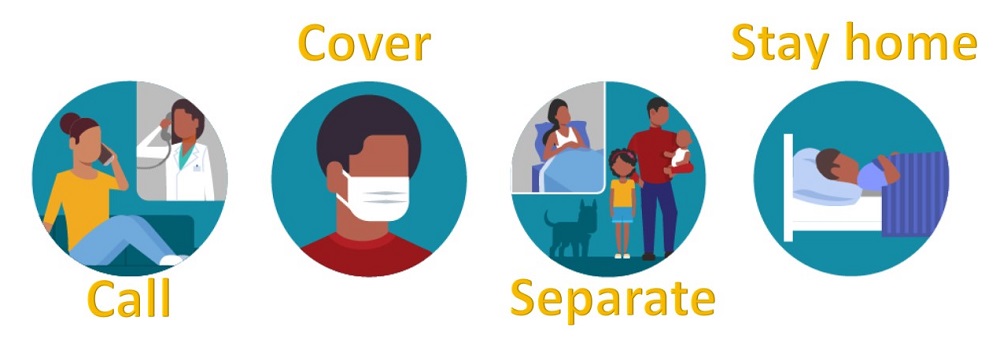[Update 15 April 2020: Face coverings are now required or recommended in many public places in Maryland.]
Now that we are taking the steps for social distancing, we will slow the rate of spread of the virus through our communities. This is great!
But, what do we do now? What happens if we start to feel sick? If you are young and otherwise healthy there is no reason for major concern. If you are older (over 60 years old), have serious underlying health conditions, or have a compromised immune system due medication, illness, or genetic condition, then the situation is more serious.
If you are young and otherwise healthy, you don’t want to contribute to overwhelming the medical system for those at greater risk. If you are young and otherwise healthy and you develop symptoms of COVID-19, like fever, dry cough, and fatigue, what should you do?
I live in Maryland, and the recommendations are likely regionally different in the US and are definitely different in other countries. In Maryland, here is what the State Health Department recommends as of 13 March 2020:
- Before you go, call your doctor, emergency room, or urgent care clinic
- Tell them about recent travel and close contacts (such as people in your household)
- Wear a mask, if one is available, or wear a homemade face covering (when in the presence of other people)
Here is what CDC recommends:
- Stay home (except to get medical care)
- Do not go to work or school or public places
- Do not take public transportation, taxis, or ride-sharing
- Stay away from other people and pets
- Stay in a specific room as much as possible
- Use a separate bathroom
- Limit contact with pets and animals (there is no evidence that you can infect your pet cat or dog)
- Call ahead before visiting the doctor or healthcare provider
- Tell them that you think you may have COVID-19 or the coronavirus
- Wear a facemask or homemade face covering if you are in the presence of other people
Remember:
- For most people, the symptoms will be fever, dry cough, and fatigue.
- Most people will not require hospitalization and will recover at home.
The reason it is important to notify your doctor or medical facility is so that testing can be done to track the spread of the disease, and so you can avoid spreading it to others. It is not necessarily because you will require hospitalization.
What if your condition worsens or you have trouble breathing?
If you experience shortness of breath or difficulty breathing, this could be a sign of pneumonia. This is more serious and could require hospitalization. Contact your hospital or doctor. If you call 911, notify them that you have symptoms of COVID-19 and are having trouble breathing.
What if you are older than 60, have a serious underlying medical condition (diabetes, heart disease, lung disease, cancer), or are immunocompromised and start to have symptoms?
Older patients and individuals who have severe underlying medical conditions or are immunocompromised should contact their healthcare provider early, even if their illness is mild. If you have severe symptoms, such as persistent pain or pressure in the chest, new confusion or inability to arouse, or bluish lips of face, contact your healthcare provider or emergency room and seek care immediately. -CDC
There are many other recommendations for what to do if you have COVID-19 on the CDC website [link updated 19 September 2022]. These include instructions for reducing the spread of the disease by
- Covering coughs and sneezes with tissues and washing hands after
- Instructions for effective handwashing
- When and how to use hand sanitizer appropriately
- Avoid sharing personal items (dishes, utensils, cups, bedding, towels)
- Cleaning areas that are touched often
- Monitoring symptoms
- When it is ok to discontinue home isolation
Related Resources
What to do if you are sick. https://www.cdc.gov/coronavirus/2019-ncov/about/steps-when-sick.html [accessed and updated 19 September 2022] and Fact Sheet PDF https://www.cdc.gov/coronavirus/2019-ncov/downloads/sick-with-2019-nCoV-fact-sheet.pdf. CDC (accessed 13 March 2020)
Coronavirus Disease 2019 (COVID-19): Frequently Asked Questions and Answers. CDC https://www.cdc.gov/coronavirus/2019-ncov/faq.html#symptoms (accessed 13 March 2020) [No longer available, see https://www.cdc.gov/covid/index.html]
Coronavirus FAQs. MD State Health Department. https://phpa.health.maryland.gov/Documents/coronavirus_FAQ.pdf (accessed 13 March 2020)
N. R. Gough, Social distancing can save your life and someone else’s. BioSerendipity (10 March 2020) https://www.bioserendipity.com/social-distancing/
Cover image details
Cite as: N. R. Gough, What to Do If You Think You Have Coronavirus COVID-19. BioSerendipity (13 March 2020). https://www.bioserendipity.com/what-to-do-if-you-think-you-have-coronavirus-covid-19/

